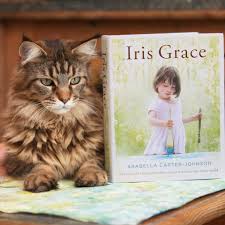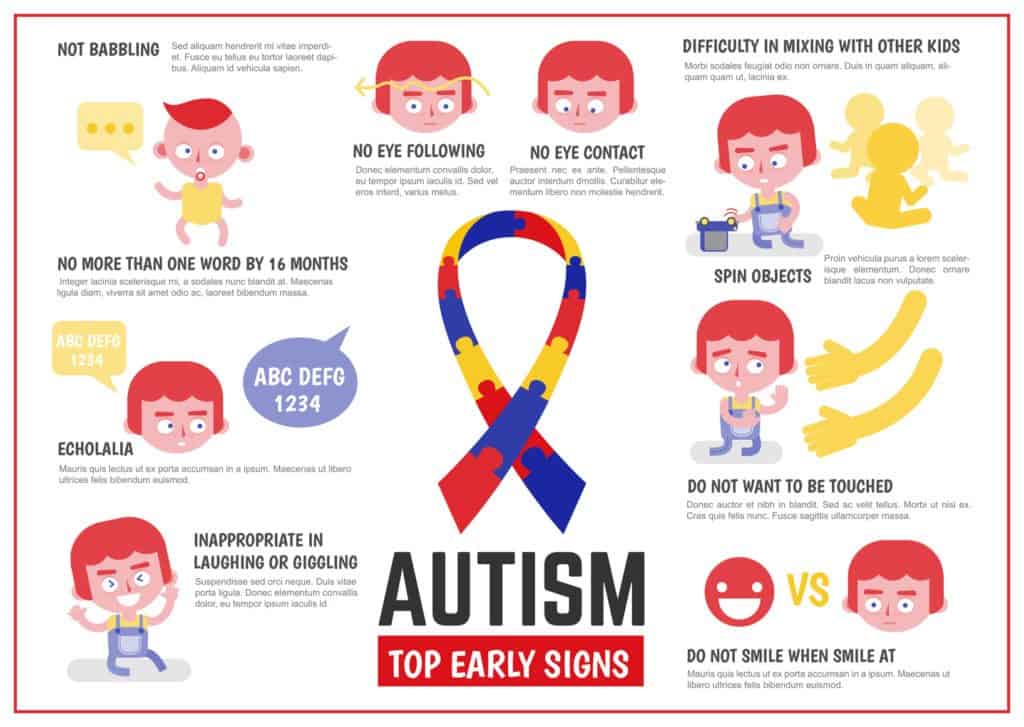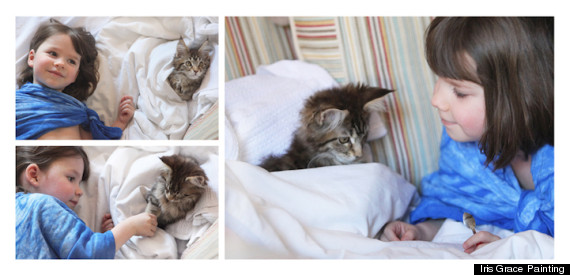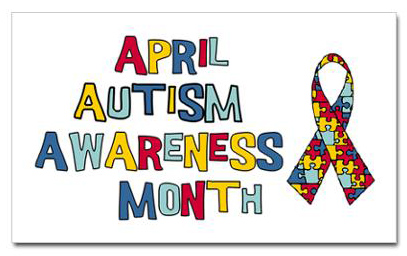Arabella Carter-Johnson is a professional photographer and author. She wrote Iris Grace, a book about her daughter who has autism, to raise awareness about the condition and animal assisted therapy. She manages the website, Iris Grace Painting, where people learn about autism and view paintings and prints by Iris Grace.
Iris Grace, a talented painter, is known for her Monet style painting. They live in Leicestershire, England.

Image courtesy Iris Grace Painting

Image courtesy Iris Grace Painting
Interview of September 19, 2018
Alexandra Wang: When did Iris first show signs of autism?
Arabella Carter-Johnson: I noticed things were different with Iris right at the beginning, Iris found looking at our faces difficult. She would cry, and would only breast feed with me lying down. She also hated to be cradled looking at us and preferred being on my shoulder, looking out to the side. She found being around others hard and would cry. She had difficulties sleeping. She was sensitive to clothes and to other sensory things like loud noises.
Iris is highly sensitive, she experiences the world on a different level than say the typical person, sometimes it can be overwhelming for her but at other times is incredible and joyous. She can fly so high on her experiences. But then, there are times where life is very challenging for her. She notices details, appreciates music, colours, light and feels things intensely, getting totally absorbed into a topic.
Alexandra Wang: How did autism affect Iris and the rest of the family before you had your therapy cat Thula?
 Image courtesy Power of Positivity
Image courtesy Power of Positivity
Arabella Carter-Johnson: I have adapted every part of our lives to her and would encourage others to do the same for their children. It is something I did naturally and with all my heart. I will never stop, but it does take a lot out of me. I get tired and feel as if I can’t give anymore.
But you take a breath, something makes me laugh, and I try again: another idea, activity, outing and we have a breakthrough. I can’t pretend it’s easy all the time or that I don’t wish life was easier for Iris. But all I can do is to try my best for her.
Things started to change quite dramatically for the better once Thula came into our lives. This inspired me to look further into the use of animals in therapy.
Alexandra Wang: How did you learn about therapy animals?
Arabella Carter-Johnson: I have had animals all of my life and practice Horse Whispering. So, I have felt a deep connection to them. But after experiencing how Iris was helped by Thula, it made me look into other animals too. I integrated these animals into our small charity – The Little Explorers Activity Club CIC.

The Little Explorers Activity Club CIC
Image Courtesy The Little Explorer Activity Club CIC
Alexandra Wang: What are some beliefs you held about animal assisted therapy and service animals that have changed with your experience?
Arabella Carter-Johnson: I imagined that you would need to tell the animal to do something or guide them. After having experience with many different animals, it seems that so much of it is intuition and reading body language.
There are differences though that people forget. For example, assistance dogs are different from therapy dogs. An assistance dog will be trained to do set tasks and those tasks that are initiated by the human to help. But a therapy animal will help on their own accord. They will be of assistance but in a different way.
Alexandra Wang: In what ways are therapy animals helpful?
Arabella Carter-Johnson: It’s not about practical issues. It’s about calming the senses, being there as a friend, being a non-judgmental soul to talk to.
With horse, for example, the movement of riding in itself has proved to have many benefits. These range from strengthening core muscles to producing oxytocin, a neurotransmitter which helps the rider open up and communicate. Being around animals also reduces cortisol, the stress hormone. In doing so, it makes people more social.
Alexandra Wang: Before she met Thula, how did Iris behave around other animals?
Arabella Carter-Johnson: She was generally quite nervous around dogs, but she didn’t seem to be bothered by cats.
Alexandra Wang: After she met Thula, how did Iris’ behavior and communication change?
Arabella Carter-Johnson: Thula understands Iris in a way that we struggle with at times. She is able to be with her without adding any extra pressure. She plays and encourages Iris in such subtle and beautiful ways. Thula has taught me a lot about how to teach Iris.
Watching them together is very special; two souls that understood one another. From the first day they met, no words were needed. Thula is with Iris for many adventures. She’s out on the bikes, the boat, walks, even swimming. Iris is now talking more and has become more confident. She is able to form relationships more easily than before we had Thula.
 Image courtesy Iris Grace Painting
Image courtesy Iris Grace Painting
Image courtesy Daily Mail
Alexandra Wang: What inspires Iris to paint pictures?
Arabella Carter-Johnson: I think nature is what inspires her. Her painting gives her a form of expression that doesn’t rely upon talking.

Image courtesy Imgur
Alexandra Wang: Is autism portrayed accurately in the media?
Arabella Carter-Johnson: It varies massively. Sometimes I feel that it’s all wrong, and then other articles I read have it right. But autism is a condition that varies to the extent that you can’t say what is autism and what isn’t. You can’t define it because it changes from one moment to the next. The doctors have given it their best shot but really it’s like a character type which morphs. It changes depending upon the environment that they find themselves in, and that includes the people around them and how their senses are reacting to everything. I know from Iris that there will never be one way of describing her and her condition. It’s not a solid form or condition.

Image courtesy Living Amongst Humans
Alexandra Wang: What would your advice be for parents who have children with autism?
Arabella Carter-Johnson: There is so much emphasis these days on being ‘normal’ & ‘fitting in.’ I think Iris and Thula are inspiring people to see how different is brilliant. Iris is unique, and her different qualities are cherished. The key is embracing who they are, not trying to coerce them into being something they are not. I believe in what’s within each child, working with their strengths and interests in an environment that suits them. As for Thula, well it’s not like you get a boating, biking, swimming super nanny cat that often. She is one of a kind, breaking stereotypes across the planet.
Alexandra Wang: What can society do as a whole to help children with autism and their families?
Arabella Carter-Johnson: Give them time and support. Don’t rush in with a million suggestions for therapies. Trust me, they probably spend every waking hour researching it.
A cooked meal, a hug, an offer to get some things from the shops are all amazing. If you suspect a child is autistic in a public place and you see the parent is having a difficulty with them, give them space, offer to carry shopping so the parent can get the child safely back to the car or to a quiet space. Ask them if you can do anything to help. In many situations, you can help by reducing noise. So, getting a fan or a radio turned off can be helpful. Reducing electrical noises and quieting things down can really help.

Image courtesy North Grand High School
Alexandra Wang: What about things that should be avoided as unhelpful?
Arabella Carter-Johnson: Don’t judge as every parent will be doing their very best in a tough situation. The kid isn’t giving us a hard time. They are having a hard time Compassion is what they need. Above all kindness is required. Imagine if it was you or your child or grandchild.

Image courtesy Therapeutic Partners
Copyright 2018 by Alexandra Wang. All rights reserved.
![]()
Very unique approach devised by this intelligent and caring mother. The paintings are beautiful, and the rapport between Iris and her cat are clear in the photos you included.
LikeLike
It really is amazing.
LikeLike